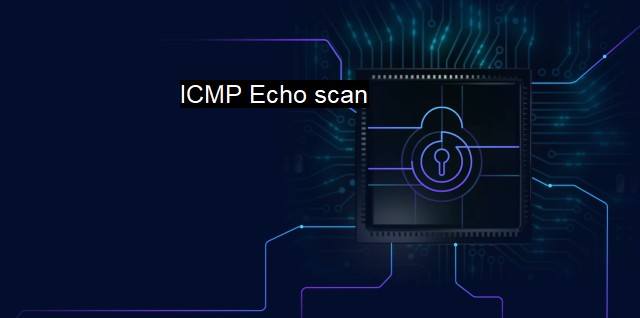What is ICMP Echo scan?
Understanding ICMP Echo Scan: A Powerful Network Scanning Technique for Cybersecurity Professionals and Antivirus Organizations
ICMP Echo scan, a term predominantly used within the cybersecurity and antivirus industry, pertains to an investigative technique applied in computer networks to discover accessible hosts. ICMP (Internet Control Message Protocol) Echo scans, more mostly referred to as Pings, form an integral part of the reconnaissance phase in ethical hacking.The ICMP is a protocol within the network layer according to the OSI model and serves multiple functions like error handling and operational management. An ICMP Echo request is a default communication process executed within the ICMP. As stated, it is analogous to broadcasting a 'Ping.' it can also be employed for malicious purposes and thus should be secured against.
This technique observes the ICMP Echo request and Echo reply messages to identify online servers in a network range. The scanning tool sends an ICMP Echo request to distinctively targeted IP addresses, and if the host is reachable and interconnected, it reciprocates with an ICMP Echo reply.
Vulnerability analysis is often conducted deploying similar ICMP Echo scans. Cybersecurity experts use them to discern open gateways or ports susceptible to malicious attachments from would-be cyber attackers. By examining the responses to ICMP Echo requests, specialists can identify exploitable vulnerabilities and preemptively fortify them.
Malicious hackers, on the other hand, use ICMP Echo scans to exploit these same vulnerabilities. An attacker can utilize the scan to discover active hosts earmarked for further exploration. Preceding an actual attack, ICMP Echo scans serve as reconnaissance tools, affording insights into the host's infrastructure, its strength, and potential weaknesses. Therefore, effective information security management demands competent management of ICMP policies to safeguard against these attack vectors.
Effectively managed cybersecurity software (antivirus applications, for instance) often incorporate countermeasures to ICMP Echo scans. One of the most common strategies is to disregard any unsolicited ICMP Echo requests, thus curtain-raising considerable obfuscation for scanning operative behind a malevolent quest. Several network host machines also prompt enhancement features that enable hosts to restrict or entirely disallow ICMP Echo requests rendering detection via echo scanning futile.
Another defensive mechanism staged against ICMP Echo scans is Network Intrusion Detection Systems (NIDS). NIDS surveil inbound network traffic for debilitating activities, such as the frequent echo requests indicative of an attempted ICMP Echo scan. Advanced NIDS can pinpoint and alert network administrators to suspected activities enabling them to initiate preemptive actions.
ICMP flood, a variant of Denial of Service (DoS) attacks, exploits the operational blueprint of ICMP Echo requests. Never-ending ICMP Echo requests can inundate a server's capacity, leading to an outage. Subsequently, Well-developed antivirus software isolates such torrential ICMP traffic, extinguishing the crippling capacity of the attack.
Studying ICMP Echo scans' machinations advances cybersecurity specialists' understanding of preventive measures against potential attacks. Besides the staple software-based countermeasures, businesses should cultivate human resources trained in such operative methodologies. Regular tutoring and upgrading on current ploys goes a long way.
To sum up, ICMP Echo Scan functions like a probe, posing significant implications for cybersecurity and antivirus software. While it can serve beneficial purposes such as network host detection, it’s also a vehicle for would-be hackers to explore their targets before launching attacks, making it the subject of both advantage and alarm.
Deployed judiciously, ICMP Echo scans assist technical reviews, monitor network availability, vet host servers, and even aid in diagnosing network issues. Despite its instrumental benefits, configuring architectures to fend off unsolicited ICMP Echo scans is fundamental for preserving secure network environments, ransom to unchecked freedom of a potentially malevolent tool.

ICMP Echo scan FAQs
What is an ICMP echo scan?
An ICMP echo scan is a type of network reconnaissance technique that sends ICMP echo request packets to a range of IP addresses to determine which hosts are alive and responsive. It is commonly used in network mapping and vulnerability assessment.How is an ICMP echo scan used in cybersecurity?
An ICMP echo scan can be used by security professionals to identify live hosts on a network and to determine the network topology. It can also be used as a precursor to more advanced attacks such as denial-of-service (DoS) attacks or network reconnaissance to identify vulnerable targets.How can an antivirus detect and prevent ICMP echo scans?
Antivirus software can detect and prevent ICMP echo scans by monitoring network traffic for suspicious activity and by blocking suspicious IP addresses. Some antivirus software may also have specific features that are designed to detect and prevent DoS attacks, which can be launched using ICMP echo requests.Are there any legal or ethical concerns associated with using ICMP echo scans?
ICMP echo scans are generally considered to be legal, as they do not involve any unauthorized access or damage to computer systems. However, there may be ethical concerns associated with using this technique without obtaining proper authorization, particularly if it is being used to target vulnerable systems or to gather sensitive information. As such, it is important to always ensure that ICMP echo scans are only used in a legally and ethically responsible manner.| | A | | | B | | | C | | | D | | | E | | | F | | | G | | | H | | | I | | | J | | | K | | | L | | | M | |
| | N | | | O | | | P | | | Q | | | R | | | S | | | T | | | U | | | V | | | W | | | X | | | Y | | | Z | |
| | 1 | | | 2 | | | 3 | | | 4 | | | 7 | | | 8 | | |||||||